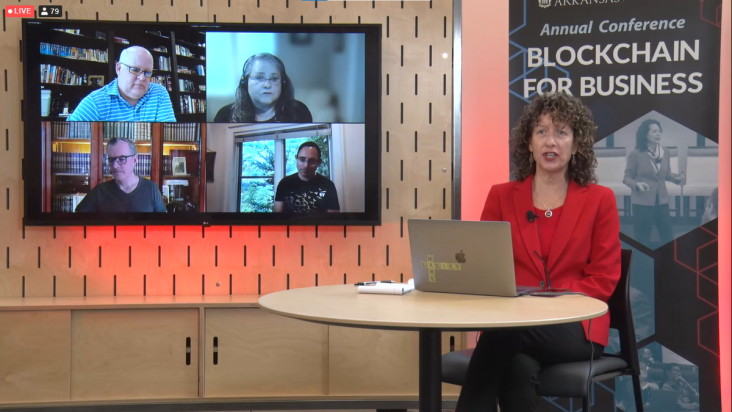Technology can ‘build a better world,’ UA blockchain leader says
by October 9, 2021 9:53 am 1,628 views

At right, Mary Lacity, director of the University of Arkansas Blockchain Center of Excellence, speaks to panelists during the virtual 2021 Blockchain for Business Conference.
Speakers and panelists provided insights into the value and ethics of blockchain systems and noted that anything can be represented as a token of the technology. The discussions took place Friday (Oct. 8) as part of a virtual event hosted by the University of Arkansas Blockchain Center of Excellence.
The 2021 Blockchain For Business Conference had more than 400 registrants and comprised five panel discussions and multiple breakout sessions regarding aspects of blockchain technology. According to Statista, blockchain is an electronic list of connected records and verified records and is known for its association with cryptocurrencies such as Bitcoin.
Mary Lacity, director of the Blockchain Center of Excellence and an information systems professor in the Sam M. Walton College of Business, explained that the future is not predestined, and she tells others she doesn’t know when asked about her outlook on technology. Lacity spoke about tech ethics in a panel with Cindy Moehring, who’s leading the business integrity leadership initiative at the Walton College.
“I believe we can come together as a community, and we can save the planet,” Lacity said. “What I’m really most excited about is we can have a world where power and control is decentralized and includes everybody. If you think about all of the technical capabilities that a blockchain enables, decentralization is the technical feature that inspires me and gives me the most hope.
“We can build a better world with technology if we build that world based on ethical principles,” she added. “Technology is not neutral. We can either use these technologies for malevolent or benevolent purposes. It all depends on whether that design is based on ethical principles.”
She pointed to the issues that social media has had on the confidence of young women or the use of fake news that’s undermining politics, health and wellbeing. She said those apps were made with an ethical void. But people can develop apps to make the world better, she noted.
“I believe we should build the world with user control,” Lacity said. “That means possession and control over their data… You actually possess it and control who sees your data.”
She explained that EY recently worked with Italian news organization Ansa to develop a blockchain solution used to verify that its content was not fake after stories on home remedies for COVID-19 were being posted as if Ansa had released them.
In March, Lacity said she started a project about digital health passes for those who have received the COVID vaccine. The Blockchain Center of Excellence is part of global consortium Good Health Pass Collaborative that developed ethical principles related to the use of vaccination credentials for international travel.
One of the principles is that no one should mandate the use of a digital health pass. Another is to allow for paper-based versions of the pass as a means to be more inclusive.
In another panel discussion that included executives of Walmart, Walmart Canada and DLT Labs, panelists highlighted the value of a blockchain system that allowed for fewer disputes with carriers, and it allowed them to be paid more quickly. The Blockchain Center of Excellence recently released a whitepaper on this. Alexey Shlykov, senior director of information and analytics for Walmart Canada, noted the company has started seven other projects using blockchain technology but declined to provide specifics when asked about them in a question-and-answer session.
Another panel discussion related to the use of blockchain tokens to represent assets. Chen Zur, partner/principal and U.S. blockchain practice leader for EY, said his long-term view of the technology is that “anything that can be tokenized will be tokenized.” In the short term, things to be represented by the tokens would include securities, food and pharmaceuticals, and gaming. But he doesn’t expect things that are not scarce, such as data, to be represented by the tokens.
Charles Hoskinson, founder of Cardano and co-founder of Ethereum, was to be the event keynote speaker but couldn’t make it, Lacity said. However, his chief counsel, Joel Telpner, recorded a conversation he’d planned to give along with Steven Lupien, director of the Center for Blockchain and Digital Initiatives at the University of Wyoming. Lacity said the video will be posted to the YouTube channel of Walton College.
